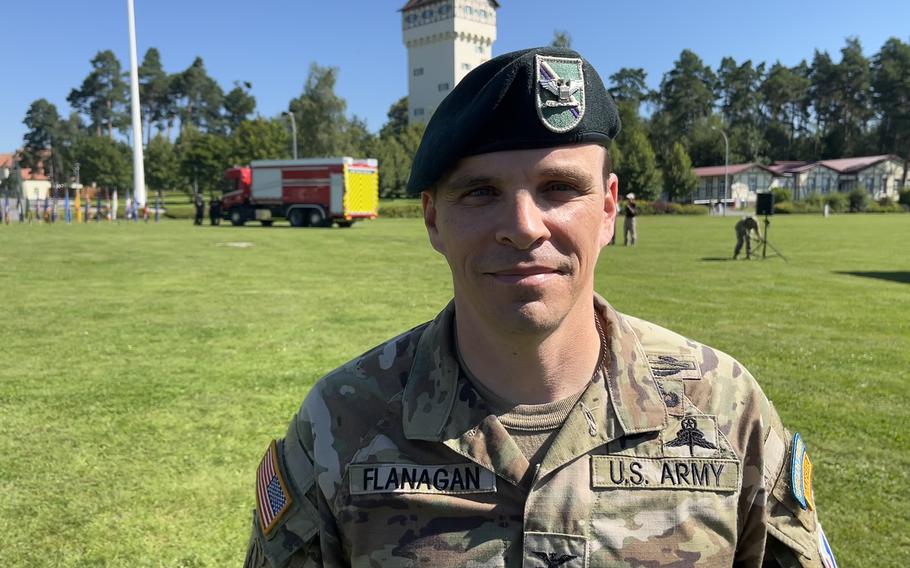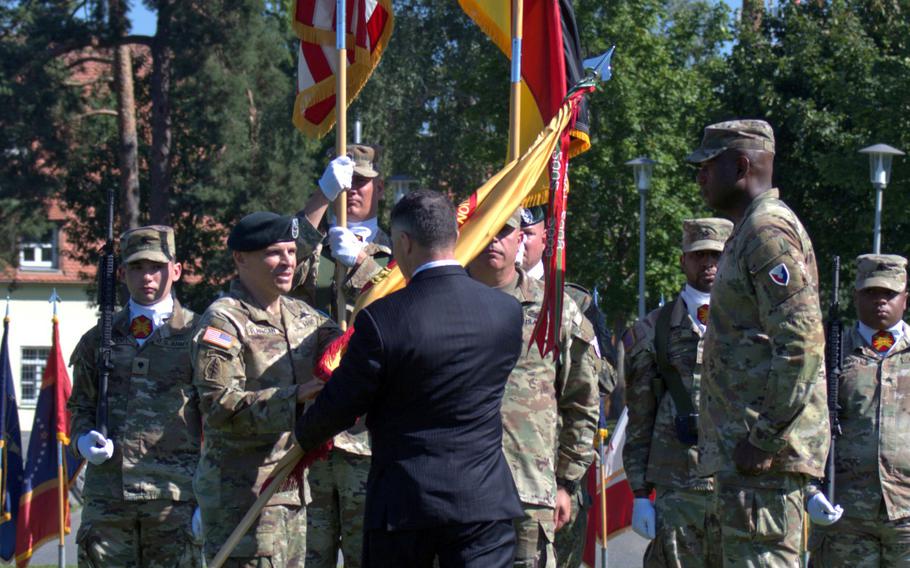
Army Col. Stephen Flanagan speaks to reporters Aug. 6, 2024, after taking command of U.S. Army Garrison Bavaria in a ceremony at Tower Barracks in Grafenwoehr, Germany. (Matthew M. Burke/Stars and Stripes)
GRAFENWOEHR, Germany — An experienced Special Forces commander with multiple combat tours of Iraq and Afghanistan took command Tuesday of a sprawling garrison in Bavaria that has provided extensive training to Ukrainian troops fighting Russia.
Col. Stephen Flanagan took leadership of U.S. Army Garrison Bavaria from Col. Kevin Poole during a ceremony on the Tower Barracks parade field.
The garrison, home to the 7th Army Training Command, is spread among four locations: Grafenwoehr, Vilseck, Hohenfels and Garmisch. It includes the vast Grafenwoehr Training Area.
Flanagan, a Massachusetts native, said in an interview after the ceremony that he would continue his predecessor’s efforts to improve infrastructure and processes such as vehicle registration.
“Funding is always a challenge,” he said. “But (we’ll) work with the teams here to continue moving things forward, to continue to make life better for the units, the soldiers, the families.”
The Bronze Star recipient takes over at a fraught time in Europe. The war between Russia and Ukraine appears to have stalled, and Russian proxies have been accused of plotting attacks on U.S. bases and personnel in Germany. Two dual German-Russian nationals were arrested in April after German prosecutors accused them of surveilling the Army training area in Grafenwoehr, the news magazine Der Spiegel reported at the time.
Flanagan comes to the Bavaria garrison after completing an Army War College fellowship with the Fletcher School at Tufts University, his Army biography states.
He is a Ranger school graduate and former airborne rifle platoon leader who was part of the task force that hunted down and captured deposed Iraqi dictator Saddam Hussein, according to the biography.
He also led a Special Forces detachment through two combat tours in Iraq, as well as in Israel and Mali.
Poole had been in charge of the garrison since July 2022. A German speaker, he is perhaps best-known for his candid, off-the-cuff updates to the force on radio and social media.
He was recognized Tuesday for supporting the training of Ukrainian troops and NATO allies, improving infrastructure and quality of life for soldiers and their families and helping to facilitate a billion-dollar training complex, which broke ground last year.

Col. Stephen Flanagan, left, accepts the U.S. Army Garrison Bavaria colors during a change of command ceremony at Tower Barracks in Grafenwoehr, Germany, on Aug. 6, 2024. (Matthew M. Burke/Stars and Stripes)